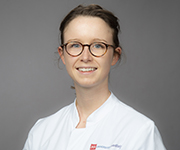
Dr. med. Astrid Alflen
Physician (Internal Medicine, Hematology and Medical Oncology), Research Group Leader
Research Interests
Cancer immunotherapies have revolutionized the treatment options for patients with advanced stage disease. However, only a subset of patients experiences (durable) response. Reasons for therapy failure can be tumor intrinsic, or due to alterations within the immune system.
Our group aims to understand the alterations of the immune system better, which contribute to treatment response and failure, especially in the context of T cell-based cancer immunotherapies like immune checkpoint blockade (ICB) and chimeric antigen receptor (CAR) T cell therapies.
By collaborations with several Departments and Institutes within the University Medical Center Mainz (Department of Hematology and Medical Oncology, University Cancer Center (UCT), Department of Dermatology, Institute of Immunology, Institute of Pathology) and with the Institute of Molecular Biology (IMB) Mainz, we aim to perform highly translational as well as latest state of the art translational research.
Projects
Project 1: Modifying macrophage polarization to improve cancer immunotherapies
The tumor microenvironment (TME) contains several immunosuppressive factors, which dampen the anti-tumor reactivity of cytotoxic T cells and therefore the efficiency of T cell-based cancer immunotherapies like immune checkpoint blockade (ICB). One of these suppressive factors are tumor-associated macrophages (TAM). Macrophages can generally polarize towards a pro-inflammatory (M1-like) or anti-inflammatory (M2-like) phenotype, with the latter supporting tumor growth.
Within this DFG-funded research project, and in collaboration with Toszka Bohn from the Institute of Immunology, we aim to characterize macrophages in melanoma tumor samples, and to analyze their correlation with response to immunotherapies. Further, we are analyzing characteristics of peripheral blood monocytes in melanoma patients, which can potentially serve as biomarkers for therapy response. To identify targets involved in macrophage polarization, we will additionally perform a CRISPR knockout screen in macrophages.
Understanding and modifying macrophage polarization within the TME can help to develop personalized immunotherapies in the future, by supporting the immune cell-mediated tumor clearance.
Project 2: Characterization of age-related functional alterations in healthy T cells that are essential for efficient CAR T cell products
T cells are one of the most important immune cell subsets in cancer immunotherapies, and they can efficiently clear cancer cells, as successfully demonstrated in cellular therapies like in chimeric antigen receptor (CAR) T cell therapies. At least since the application of this therapy as standard of care for some hematologic malignancies, defining and modifying T cell fitness, and thus the efficacy of this treatment, is a major research focus in this field.
It is well established, that chronological and biological age of humans do not necessarily correlate. Therefore, we study aging of T cells as a specific factor influencing their fitness status. Firstly, we are addressing this research question in healthy donors. We produce CD19 CAR T cells, and analyze them for CAR T cell functionality and aging aspects. Furthermore, we are studying their transcriptome for differential gene expression between fit and unfit CAR T cells, to identify targets or gene expression signatures potentially determining CAR T cell therapy response. Subsequently, we will validate our findings in a CAR T cell-treated patient cohort.
With our results, we aim to contribute to an individualized therapy decision making in the growing field of (cellular) cancer immunotherapies, and to modulate (CAR) T cell fitness to improve treatment response rates.
Publications (Auswahl)
-
Lin, C.P.*, Levy, P.L.*, Alflen, A.*, Apriamashvili, G.*, Ligtenberg, M.A., Vredevoogd, D.W., Bleijerveld, O.B., Alkan, F., Malka, Y., Hoekman, L., et al. (2024). Multimodal stimulation screens reveal unique and shared genes limiting T cell fitness. Cancer Cell.
*These authors contributed equally -
Alflen, A., Aranda Lopez, P., Hartmann, A.K., Maxeiner, J., Bosmann, M., Sharma, A., Platten, J., Ries, F., Beckert, H., Ruf, W., et al. (2020). Neutrophil extracellular traps impair fungal clearance in a mouse model of invasive pulmonary aspergillosis. Immunobiology 225, 151867.
-
Ries, F., Alflen, A., Aranda Lopez, P., Beckert, H., Theobald, M., Schild, H., Teschner, D., and Radsak, M.P. (2019). Antifungal Drugs Influence Neutrophil Effector Functions. Antimicrob Agents Chemother 63.
-
Kuemmel, A., Alflen, A., Schmidt, L.H., Sebastian, M., Wiewrodt, R., Schulze, A.B., Buhl, R., and Radsak, M. (2018). Soluble Triggering Receptor Expressed on Myeloid Cells 1 in lung cancer. Sci Rep 8, 10766.
-
Alflen, A., Stadler, N., Aranda Lopez, P., Teschner, D., Theobald, M., Heß, G., and Radsak, M.P. (2018). Idelalisib impairs TREM-1 mediated neutrophil inflammatory responses. Sci Rep 8, 5558.
-
Alflen, A., Prüfer, S., Ebner, K., Reuter, S., Aranda Lopez, P., Scharrer, I., Banno, F., Stassen, M., Schild, H., Jurk, K., et al. (2017). ADAMTS-13 regulates neutrophil recruitment in a mouse model of invasive pulmonary aspergillosis. Sci Rep 7, 7184.
-
Lopez, P.A., Denny, M., Hartmann, A.K., Alflen, A., Probst, H.C., von Stebut, E., Tenzer, S., Schild, H., Stassen, M., Langguth, P., et al. (2017). Transcutaneous immunization with a novel imiquimod nanoemulsion induces superior T cell responses and virus protection. J Dermatol Sci 87, 252-259.
-
Stadler, N., Hasibeder, A., Lopez, P.A., Teschner, D., Desuki, A., Kriege, O., Weber, A.N.R., Schulz, C., Michel, C., Heβ, G., et al. (2017). The Bruton tyrosine kinase inhibitor ibrutinib abrogates triggering receptor on myeloid cells 1-mediated neutrophil activation. Haematologica 102, e191-e194.
- Hasibeder, A., Stein, P., Brandwijk, R., Schild, H., and Radsak, M.P. (2015). Evaluation and Validation of the Detection of soluble Triggering Receptor Expressed on Myeloid Cells 1 by Enzyme-linked immunosorbent Assay. Sci Rep 5, 15381.

